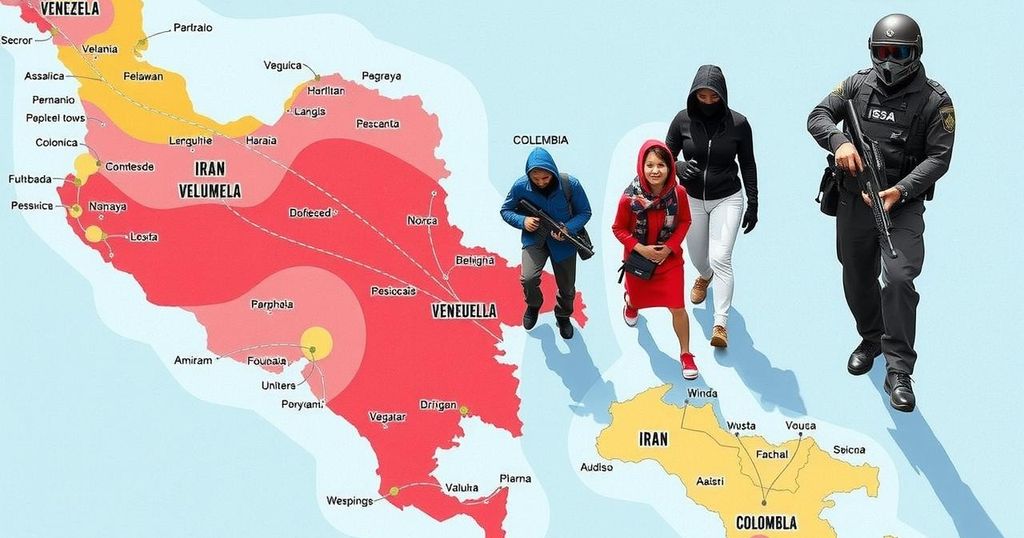The increasing number of Iranian nationals in Colombia, linked to Venezuela, raises security concerns amid strengthening ties between Iran and the Maduro regime. This collaboration, marked by economic exchanges and military partnerships, poses challenges for regional stability as both countries navigate international isolation and pressure.
Recent developments have raised alarms among Latin American security officials and Western diplomats regarding the increasing presence of Iranian nationals, reportedly utilizing fraudulent passports linked to Venezuela, within Colombia. This surge in Iranian individuals coincides with Venezuelan President Nicolás Maduro’s controversial re-election celebrations, during which he publicly acknowledged Iran and its significance to his administration, signaling a strengthening of bilateral relations. In his speech, he shouted, “Long live the Islamic Republic of Iran,” an embrace that underscores Venezuela’s pivot towards its strategic ally amidst geopolitical isolation.
Iran’s Foreign Ministry spokesperson, Esmail Baghaei, affirmed Tehran’s support for Maduro’s regime, promising enhanced cooperation against perceived threats from the United States. This partnership positions Iran alongside key allies of Venezuela, such as Russia, Cuba, and Nicaragua, all of whom support Maduro amid concerns over the legitimacy of his recent election. Amidst these dynamics, the return of Alex Saab—a businessman with substantial ties to Maduro—has expedited economic and strategic collaborations between Iran and Venezuela, with Saab being appointed as Minister of Industry.
Colombian migration authorities have observed increasing Iranian citizens misusing counterfeit Greek documents to transit through Colombia, likely seeking to access broader international flight connections. Incidents at major airports have highlighted sophisticated forgery techniques, indicative of state-level coordination perceived by security analysts. Moreover, the military collaboration between Iran and Venezuela has evolved, with reports indicating joint drone development initiatives, facilitating Venezuela’s capabilities in aerial surveillance and combat.
Disturbingly, the Lebanese militant group Hezbollah appears to be establishing operational bases on Venezuelan soil, embedding their network within Maduro’s illicit economy and using familial structures to maintain control, as described by foreign policy expert Joseph M. Humire. Intelligence assessments suggest that Venezuelan nationals are receiving preliminary training in Venezuela before proceeding to specialized combat training conducted in Iran.
The economic dimensions of this relationship further complicate security assessments, as Iranian airline Mahan Air continues regular operations between the two nations despite international sanctions. These flights are believed to underpin a gold-for-oil exchange strategy that both nations utilize to evade sanctions. Last November, Iran and Venezuela finalized 289 bilateral agreements across various sectors, signaling the entrenchment of their alliance, reflective of the historical ties established during Hugo Chávez’s presidency.
The deepening collaboration between Tehran and Caracas, particularly in defence and illicit trade, presents a multifaceted challenge for regional security agencies and Western policymakers as they navigate the geopolitical ramifications of this emergent axis of influence.
The Iranian influx to Venezuela via Colombia reflects a concerning trend of increasing Iranian influence in Latin America. The relationship between Iran and Venezuela has escalated, particularly under the leadership of Nicolás Maduro, who relies on Tehran for support amidst widespread international isolation and sanctions. The cooperation encompasses multiple domains, including military, economic, and illicit activities, driven by shared geopolitical interests that pose challenges to regional security and stability.
In conclusion, the significant rise in Iranian nationals in Colombia and the strengthening ties between Iran and Venezuela raise grave concerns regarding national security in Latin America. The strategic alliance encompasses intricate economic and military collaborations, which could enable both nations to counteract international pressures and sanctions. This evolving relationship warrants close scrutiny by regional and global security stakeholders, as it may shift the geopolitical landscape in Latin America.
Original Source: www.intellinews.com






